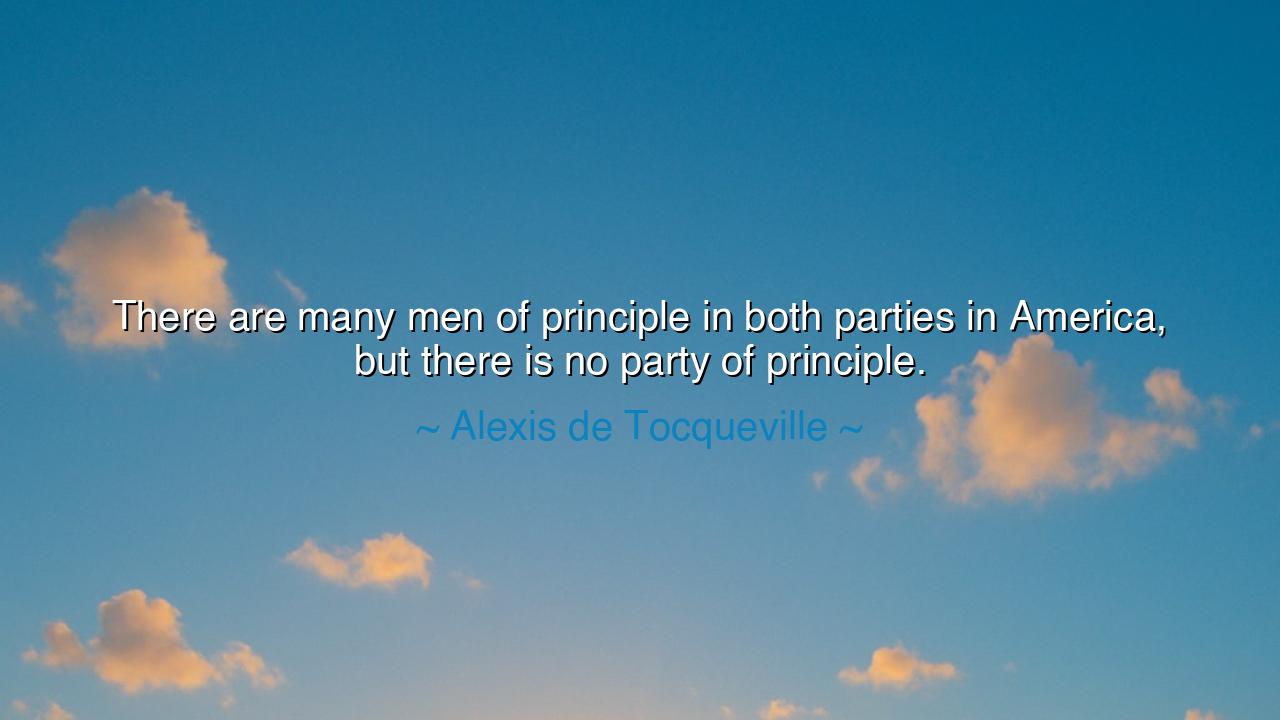
There are many men of principle in both parties in America, but
There are many men of principle in both parties in America, but there is no party of principle.






Listen now to the words of Alexis de Tocqueville, a philosopher and observer of the American experiment, whose keen insights into the soul of nations have echoed through history. "There are many men of principle in both parties in America, but there is no party of principle." In these words, Tocqueville speaks of a deep truth—a truth about the conflict between individual integrity and the collective machinery of politics. He sees that while individuals within the great political parties of America may hold fast to principles, the parties themselves, as institutions, often fall prey to pragmatism, compromise, and the corrupting forces of power.
In his time, Tocqueville observed the growing power of political parties, and how these entities—though filled with men who may have been guided by honor, wisdom, or integrity—were often driven by the demands of political survival. These parties, he observed, were not defined by a singular commitment to any moral or ethical code, but rather by the will to gain and maintain power. They were vehicles for ambition and were too often swayed by the tides of public opinion, the need for victory at any cost. In this, Tocqueville foresaw a great danger, for while individuals may act with the noblest of intentions, the institutions they build can become empty shells that serve only the pursuit of power.
The ancient world offers us a potent example in the story of Rome, where men of great principle—like Cato the Younger, known for his unwavering adherence to justice and virtue—were often caught in the machinery of a political system that did not value such principles. Cato stood for the Republic, for the rule of law, and for integrity in all things. Yet, the Roman Senate itself had become a place of ambition, manipulation, and power struggles, where the principles of the Republic were often sacrificed for the sake of expediency. Cato’s refusal to compromise ultimately led to his tragic end, yet his principle endured as a testament to the personal courage required to uphold one’s beliefs in a system that had long lost its way.
Similarly, in the more modern age, we see the rise of political machines that bear the same flaws. Take, for example, the Gilded Age in America, when political parties like the Republicans and Democrats became vehicles for corporate influence and corruption, far removed from the ideals of liberty and democracy that had once defined the nation. While many individuals within these parties, like Theodore Roosevelt, strove to fight corruption and uphold the spirit of justice, the larger structures of power they worked within often acted in ways that undermined the very principles they sought to defend. Roosevelt’s Progressive movement, though noble in its aims, struggled against a political system where the needs of the powerful drowned out the voices of principle.
Thus, the lesson Tocqueville imparts is one of caution—a warning that the parties we build to serve the people can easily become corrupted by the very power they are meant to wield for good. When the machinery of politics is no longer guided by principle, it becomes a tool for those who seek power for its own sake, rather than for the betterment of society. This, dear listener, is the danger of partisanship: that it can devour the principles it was meant to uphold. It is the people—the individual, the citizen—who must constantly guard against this transformation, lest the party become a machine of compromise and ambition.
The challenge, therefore, is to recognize that principle cannot be confined to political factions. It must be carried by the individual, who acts in the world not for the party, but for a higher cause—for truth, for justice, and for the common good. When we lose sight of these higher ideals, when we become consumed by the machinery of politics, we risk losing the very soul of our society. The lesson is clear: do not place your faith in institutions that are driven by power alone. Place your faith in the principles that should guide them.
In your own life, as you engage with the world—whether in politics, in business, or in everyday interactions—remember that it is your principles that define you, not the institutions you belong to. Let those principles guide you, and when you find yourself caught in a system that seeks to undermine them, have the courage to act with integrity, as Cato did, or as Roosevelt did, or as Tocqueville himself urged us to do. Be the bearer of principles in a world that often seeks to sacrifice them. For when we stand firm in our beliefs, the world cannot easily bend us to its will.






AAdministratorAdministrator
Welcome, honored guests. Please leave a comment, we will respond soon